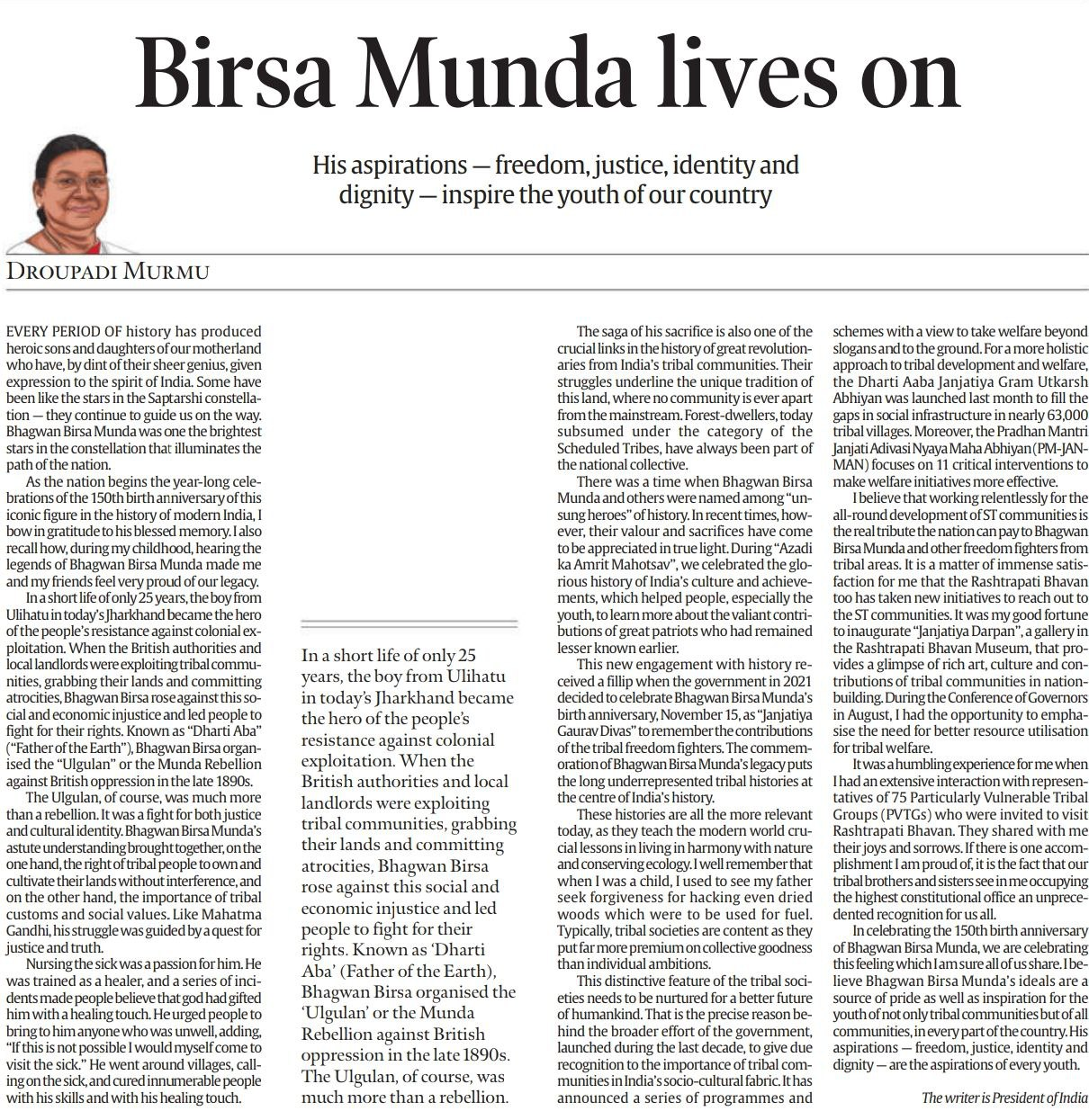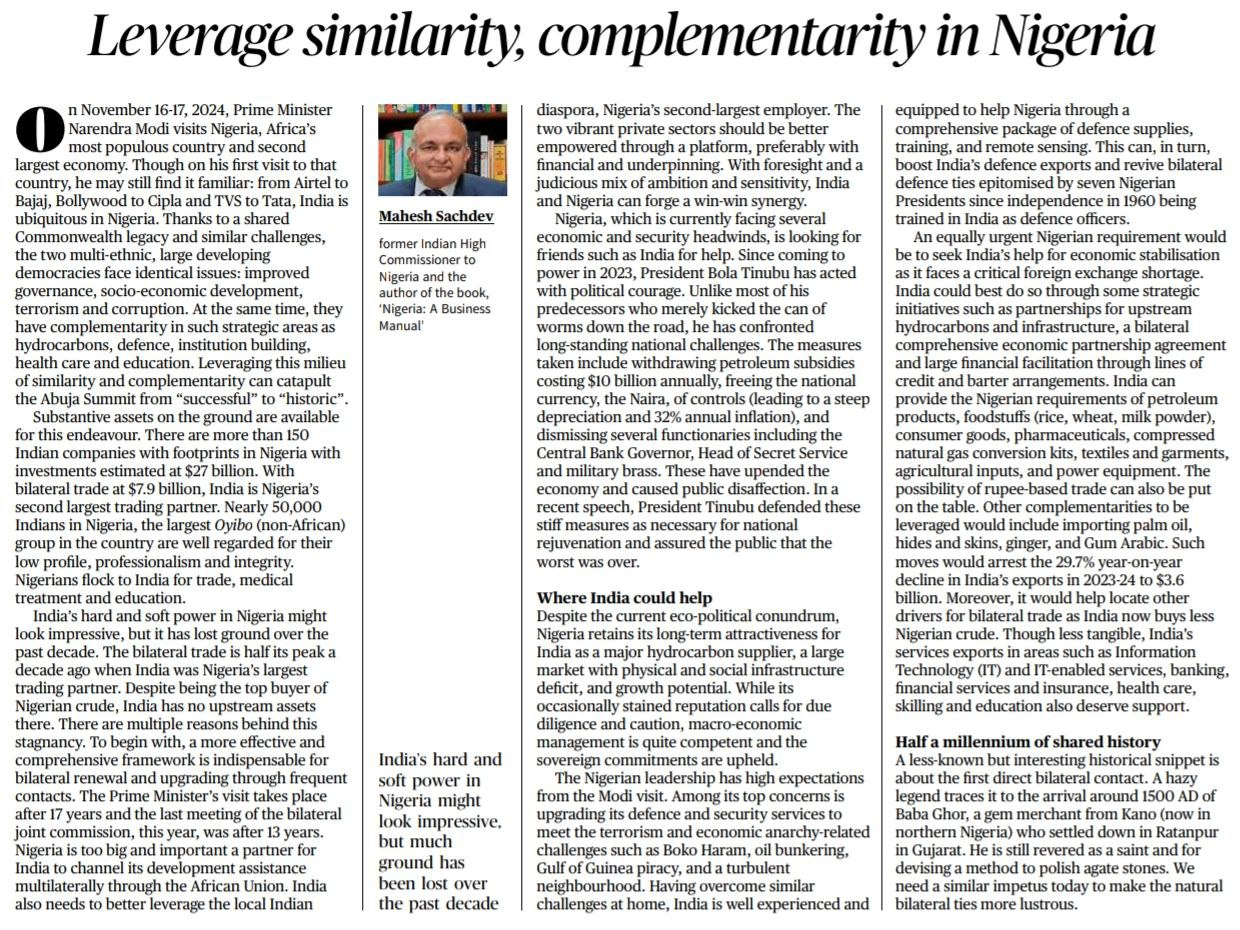1. Birsa Munda: A Revolutionary Legacy of Freedom and Justice
Introduction
- Birsa Munda, a tribal freedom fighter, social reformer, and religious leader, played a significant role in India’s struggle against British colonial rule and the exploitation of tribal communities.
- Revered as “Dharti Aba” (Father of the Earth), he became an icon of resistance and a symbol of the aspirations of tribal communities for freedom, justice, identity, and dignity.
Historical Background
- Early Life:
- Born in 1875 in Ulihatu (present-day Jharkhand).
- His short life of 25 years left a profound impact on tribal identity and freedom movements.
- Colonial Exploitation:
- The British authorities and local landlords exploited tribal communities through land grabbing and unjust practices.
- This exploitation led to economic deprivation and social injustices.
Birsa Munda’s Contributions
- Social Reform and Tribal Unity:
- Advocated for tribal rights over land and resources.
- United various tribal communities to fight against exploitation.
- Religious Leadership:
- Led a socio-religious movement to revive tribal cultural identity.
- Opposed forced conversions and promoted traditional tribal beliefs.
- Political and Revolutionary Role:
- Led the “Ulgulan” (The Great Tumult), a tribal rebellion against colonial rule.
- Organized the Munda Rebellion, focusing on the right to land and self-governance.
- His efforts marked a significant assertion of tribal identity and resistance.
Legacy and Recognition
- Posthumous Recognition:
- Government initiatives like observing November 15 (Birsa Munda’s birth anniversary) as “Janjatiya Gaurav Divas.”
- Focus on improving the socio-economic conditions of Scheduled Tribes through schemes like the Pradhan Mantri Adivasi Vikas Abhiyan.
- Inspiration for Youth:
- Birsa Munda’s ideals of justice and equality continue to inspire movements advocating for tribal rights and social justice.
Government Initiatives Inspired by Birsa Munda
- Welfare schemes targeting tribal communities, such as:
- Pradhan Mantri Awas Yojana (Gramin) for housing.
- Janjatiya Gaurav Abhiyan to improve education, healthcare, and infrastructure for tribal populations.
Conclusion
- Birsa Munda’s fight for freedom, justice, and dignity remains a testament to the resilience and spirit of India’s tribal communities.
- His life serves as an enduring inspiration for addressing contemporary challenges related to tribal welfare and socio-economic equality.
Practice Question |
Q. Birsa Munda’s contributions went beyond resistance to colonial exploitation, serving as a beacon of tribal unity and socio-political reform. Discuss his legacy and its relevance in addressing contemporary challenges faced by Scheduled Tribes. (250 words)
|
2. India-Nigeria Relations: Leveraging Similarities and Complementarities
Introduction
- Prime Minister Narendra Modi’s visit to Nigeria in November 2024 underscores the significance of strengthening bilateral ties between the two nations.
- Nigeria, Africa’s most populous country and its second-largest economy, shares a rich history and several commonalities with India, such as a Commonwealth legacy and challenges in socio-economic development.
Current State of Relations
- Economic Engagement:
- Bilateral trade stands at $7.9 billion, making India Nigeria’s second-largest trading partner.
- Over 150 Indian companies have a significant footprint in Nigeria, with investments estimated at $27 billion.
- Indian Diaspora in Nigeria:
- Approximately 50,000 Indians form a well-regarded community in Nigeria, contributing to sectors such as trade, healthcare, and education.
Key Areas of Complementarity
- Energy and Hydrocarbons:
- Nigeria, rich in oil and natural gas, can meet India’s energy needs, while India offers expertise in refining and distribution.
- Defence and Security:
- India’s capabilities in defence production and training can support Nigeria’s security goals.
- Education and Healthcare:
- Indian institutions and healthcare providers can enhance access to affordable education and medical services in Nigeria.
- Infrastructure Development:
- India can assist in building Nigeria’s critical infrastructure through partnerships and financial facilitation.
- Agriculture and Food Security:
- Collaboration in agriculture, food processing, and commodities like palm oil and gum Arabic is vital for trade diversification.
Challenges in the Relationship
- Decline in bilateral trade, which is currently half of its peak a decade ago.
- Stagnation due to outdated bilateral frameworks and infrequent high-level engagements (last bilateral joint commission meeting was held 13 years ago).
- Geopolitical issues such as Nigeria’s exchange rate crisis and reduced government revenues impacting trade and investment.
Opportunities to Strengthen Ties
- Leveraging Rupee-Based Trade: A rupee-based trading mechanism could stabilize trade flows.
- Strategic Initiatives: Partnerships in hydrocarbons and a comprehensive economic partnership agreement.
- Regional and Global Diplomacy: India can support Nigeria’s development aspirations through the African Union and multilateral forums.
- Cultural and Historical Linkages: Promoting shared historical ties, such as the legacy of Indian traders in Kano, can enhance people-to-people connections.
Conclusion
- With foresight and a structured approach, India and Nigeria can leverage their shared strengths to forge a robust partnership.
- Revitalizing economic and strategic ties, addressing trade imbalances, and fostering mutual development will ensure the relationship is elevated to new heights.
Practice Question
|
Q. Discuss the scope and challenges of India-Nigeria relations in the context of recent developments. Highlight how their complementarities can be leveraged for mutual benefit. (250 words) |



